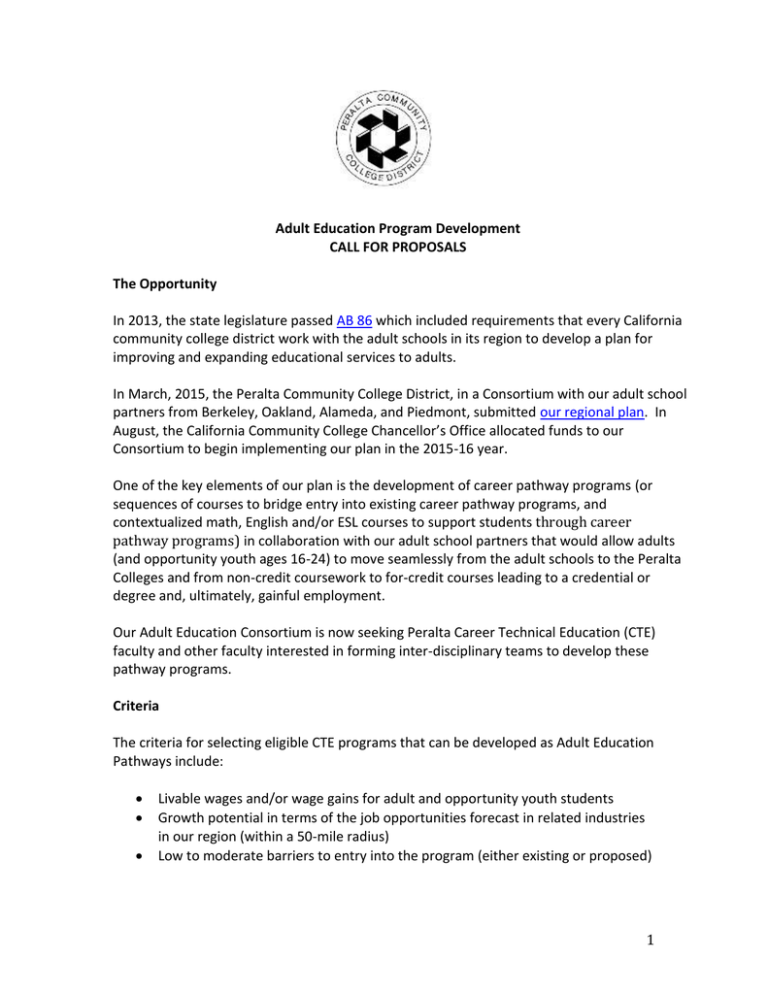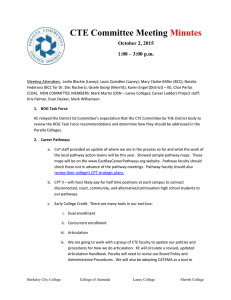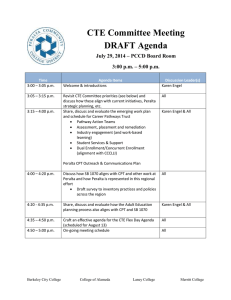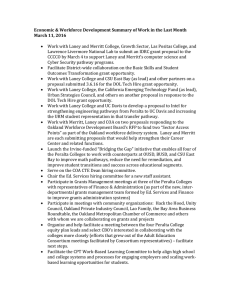Peralta Adult Education Program Development as of 8 28 15
advertisement

Adult Education Program Development CALL FOR PROPOSALS The Opportunity In 2013, the state legislature passed AB 86 which included requirements that every California community college district work with the adult schools in its region to develop a plan for improving and expanding educational services to adults. In March, 2015, the Peralta Community College District, in a Consortium with our adult school partners from Berkeley, Oakland, Alameda, and Piedmont, submitted our regional plan. In August, the California Community College Chancellor’s Office allocated funds to our Consortium to begin implementing our plan in the 2015-16 year. One of the key elements of our plan is the development of career pathway programs (or sequences of courses to bridge entry into existing career pathway programs, and contextualized math, English and/or ESL courses to support students through career pathway programs) in collaboration with our adult school partners that would allow adults (and opportunity youth ages 16-24) to move seamlessly from the adult schools to the Peralta Colleges and from non-credit coursework to for-credit courses leading to a credential or degree and, ultimately, gainful employment. Our Adult Education Consortium is now seeking Peralta Career Technical Education (CTE) faculty and other faculty interested in forming inter-disciplinary teams to develop these pathway programs. Criteria The criteria for selecting eligible CTE programs that can be developed as Adult Education Pathways include: Livable wages and/or wage gains for adult and opportunity youth students Growth potential in terms of the job opportunities forecast in related industries in our region (within a 50-mile radius) Low to moderate barriers to entry into the program (either existing or proposed) 1 Stackable credentials (either existing or proposed) such that students can continue their education and the sophistication of their skills while working and being “job ready.” Contextualized English, ESL, and math courses (either existing or proposed) A high level of interest and motivation of all proposed faculty (CTE, English, math, counselors) as evidenced by the existence and level of participation of an industry advisory committee and a history of collaboration between the department and other departments, community-based organizations, adult schools and/or employers. Required Elements of a Proposal A successful proposal will identify a team, a narrative describing the nature of the program you would like to propose or develop, a corresponding budget including a description of the level of effort required to build out the adult education pathway program (ensuring that every aspect of the criteria listed above has been addressed) and the level of involvement (roles, responsibilities, time commitment) of adult school counterparts. 1. Design Team: An Adult Education CTE program design team should have, at a minimum, the following represented (not all need to be compensated – level of effort should match proposed compensation): a. A CTE lead; b. Adult School counterparts/partners (contact Karen Engel in Educational Services to be connected to Adult School counterparts) c. The following advisors/liaison(s) from your college: i. A basics skills English lead ii. Math lead iii. ESL lead iv. DSPS lead (or advisor) v. A counselor (liaison) – if needed vi. The college’s curriculum committee chair or co-chair (if new curriculum is being proposed/developed) 2. A review and evaluation of existing CTE pathway programs (including minutes from the program’s latest industry advisory committee meeting) serving the target population and a rationale for your proposed selection (per the criteria). 3. Identification any gaps or new programs that need to be developed. 4. A plan for filling gaps or developing new courses or programs as needed and/or as evidenced in the latest Program Review or Annual Program Update. 5. A budget corresponding to the proposed program development level of effort and timeline. 2 6. Details regarding the adult school partners and their roles, responsibilities, and time commitment. Deliverables If your proposal is accepted and funded, your Design Team will need to adhere to the timetable below (stipends will not be disbursed to programs developed beyond this timeframe. They will be disbursed as soon as all aspects of your program are complete and accepted by the N. California Regional Adult Education Consortium Working Group. Schedule Proposals due: Draft program designs due: Final programs due: Curriculum developed (if necessary):* New curriculum to CIPD: New Program Launch Program implementation: September 18, 2015 October 15, 2015 November 1, 2015 November 1, 2015 By end of the fall semester, 2015 By March 1, 2016 Fall semester, 2016 Resources Available All faculty part of an Adult Education Program Design Team is eligible for an extra service stipend. The amount of the stipend will be a function of the level of effort embodied in the proposal. Budgets Please submit a budget detailing the level of effort of (in terms of number of hours) and deliverable(s) for each team member. Ensure that your budget aligns with the scope of your proposed program and the timeline listed above under Schedule. Provide a total estimate for the cost of your proposal. Submittal Submit an electronic copy of your proposal and its corresponding budget no later than September 10, 2015 at 5 p.m. to: Dr. Karen Engel Director of Economic & Workforce Development Educational Services Peralta Community College District 333 East 8th Street 3 Oakland, CA 94606 (510) 466-7389 kengel@peralta.edu The members of the N. Alameda County Regional Adult Education Consortium Working Group (see members below) will review proposals and notify funded projects no later than September 20, 2015. Work should begin immediately if your proposal is funded. Members of the N. Alameda Regional County Adult Education Regional Consortium Working Group Michael Brady, Piedmont Adult School Peter Brown, Laney College Joy Chua, Alameda Adult School Lisa Cook, Laney College Judy Flores, Oakland Adult School Ron Nelson, Merritt College Sue Pon, Oakland Adult School Cleavon Smith, Berkeley City College Karen Engel, Educational Services Berkeley Adult School representative TBD *Existing courses should be utilized or adapted as much as possible 4



